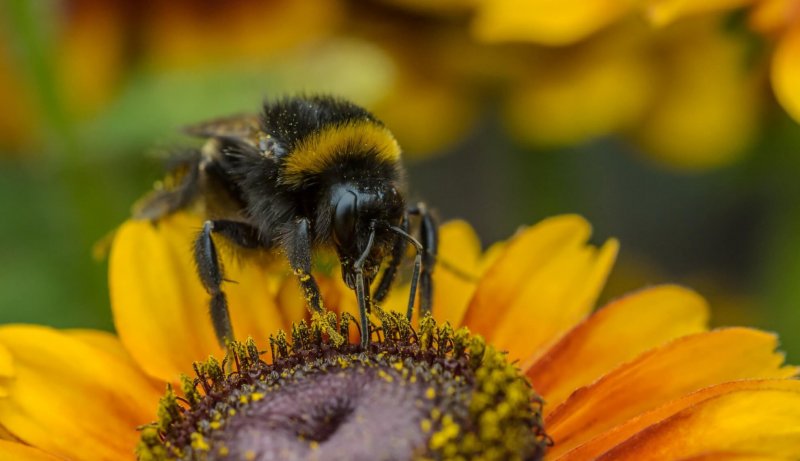The Mass Extinction Humans Don’t Realize Matters
Humankind could be about to bid farewell to countless species it never got to know. Bees are among the insects facing drastic population loss. (Dominik Scythe / Unsplash)
Bees are among the insects facing drastic population loss. (Dominik Scythe / Unsplash)
Humankind could be about to bid farewell to friends it never got to know, as insect extinction overtakes countless species.
Most of the millions of insects that support life on the planet have yet to be named or described. And yet perhaps 500,000 species of beetles, butterflies, bees, ants and other six-legged creatures vital to the efficient working of natural ecosystems and commercial economies could be about to disappear – as a consequence of climate change and other pressures driven by human population growth.
And this note of alarm has been sounded within a few days in which other research groups have separately warned of the climate threats to beetles in the Amazon forest, to the burrowing mayflies of the American mid-west and to the bumblebees of North America and Europe.
Insects pollinate growing plants, dispose of dying ones and serve as lunch or supper for birds, amphibians, reptiles, bats and other mammals. There could be as many as 5.5 million distinct species of insect, of which no more than one in five has been observed, identified and catalogued by entomologists.
A million or more creatures fashioned by aeons of evolution and natural selection could be at imminent risk of extinction because of human advance. A group of 30 experts now urgently warns in the journal Biological Conservation that half of these could be insects.
“From pollination and decomposition, to being resources for new medicines, insects provide essential and irreplaceable services.”
“It is surprising how little we know about biodiversity at a global level, when only about 10 to 20% of insect and other invertebrate species have been described and named. And of those with a name, we know little more than a brief morphological description, maybe part of the genetic code and a single site where it was seen some years ago,” said Pedro Cardoso, of the Finnish Museum of Natural History in Helsinki, who led the study.
“With species loss, we lose not only another piece of the complex puzzle that is our living world, but also biomass, essential to feed other animals in the living chain, unique genes and substances that might one day contribute to cure diseases, and ecosystem functions on which humanity depends.”
The researchers argue that insect species are vulnerable to human changes to their natural habitat; to pesticide and fertiliser use; to light pollution, industrial pollution and even noise pollution. Climate change driven by fossil fuel combustion amplifies the hazard: the unfamiliar seasonal temperatures and the advance of spring mean for instance that butterflies have emerged ahead of the nectar plants that normally nourish them.
And a series of separate studies explore some of the impact of human-triggered changes to natural systems. Researchers report in the journal Biotropica that hotter and drier episodes in the Amazon rainforests have led not only to disastrous fires but to a dramatic collapse of dung beetle populations.
Vanishing beetles
These little creatures spread nutrients and seeds, and ecologists see them as evidence of the overall health of an ecosystem, which is why international teams of scientists have been monitoring dung beetles from 98 species across 30 forest plots in the Brazilian state of Pará.
In 2010, they counted 8000 beetles. In 2017, after an El Niño event had brought drought and fire to the region, they found only 2,600.
Mayflies, too, are seen as indicators of the health of rivers, lakes and streams: the more there are, the better the water quality. The burrowing mayfly makes a spectacular emergence each year from US waterways to darken the skies. Researchers have estimated more than 87 billion insects in one swarm, weighing more than 3,000 tonnes of potential bird and fish food.
But researchers report in the Proceedings of the National Academy of Sciences that between 2015 and 2019 scientists used radar to monitor the swarms over Lake Erie and found that as a consequence of a warming climate and other pressures, numbers fell in that four-year sequence by 84%.
And in the journal Science, Canadian and British scientists report that they looked at more than a century of records of 66 species of bumblebee in North America and Europe, to find that, within one human generation, as global heating amplified the frequency of extreme temperatures and droughts, the likelihood of a bumblebee population surviving in a given place had fallen on average by 30%.
Not insects alone
That insects may be in trouble is not news: naturalists have measured huge losses over time in sample locations, often as a consequence of habitat destruction, but also as a consequence of local climate shifts in response to global heating. These losses have been mirrored in bird predator populations and even in changes in insects themselves.
As the authors of the Biological Conservation paper point out, the damage goes beyond the insect world. Other creatures depend on insects, directly or indirectly. So do humans.
“With insect extinctions, we lose much more than species,” Dr Cardoso and his colleagues write. “We lose abundance and biomass of insects, diversity across space and time with consequent homogenisation, large parts of the tree of life, unique ecological functions and traits, and fundamental parts of extensive networks of biotic interactions.
“Such losses lead to the decline of key ecosystem services on which humanity depends. From pollination and decomposition, to being resources for new medicines, habitat quality indication and many others, insects provide essential and irreplaceable services.”
Your support matters…Independent journalism is under threat and overshadowed by heavily funded mainstream media.
You can help level the playing field. Become a member.
Your tax-deductible contribution keeps us digging beneath the headlines to give you thought-provoking, investigative reporting and analysis that unearths what's really happening- without compromise.
Give today to support our courageous, independent journalists.









You need to be a supporter to comment.
There are currently no responses to this article.
Be the first to respond.